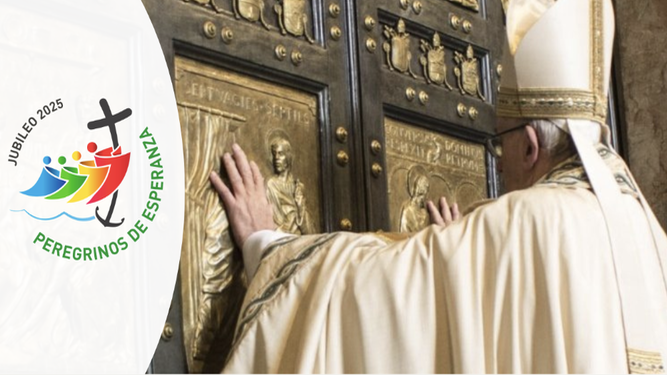“The truce in the Holy Land reinforces peace”

(Vatican News).-A “new today.” A horizon on which to look with a renewed gaze, fueled by the deep “thirst” for spirituality and answers which the hectic conditions of the world make increasingly urgent. To quench this thirst, the beauty of hope and prayer, lived in their “active and concrete dimension”, capable of inspiring an “extroverted” Church, close to the “little ones” of our time: people with disabilities, prisoners, victims of abuse.
‘RD Report’ with analysis and the Final Document of the Synod
The new day, however, only comes true “awakening” consciousnessopening to tangible peace futuresas expected in Middle East. A community that assumes the debt of the poorest countries, combats the benefits linked to the production of weapons, promotes more decent and secure jobs, and supports reception channels that see migrants as people, not as numbers or “weapons.”

The hope of the Jubilee, therefore, translates into the ability to recognize “the blades of grass between the cracks”, seeing the good that can emerge even in the most difficult situations.
With these auspices, which expressed the Cardinal Matteo Zuppipresident of the Italian Episcopal Conference, opened yesterday, January 20, the winter session of the Permanent Council scheduled in Rome until the 22nd.
“Jubilee today”
“How important it is to set a new today!” is the exhortation that guides the reflection of Cardinal Zuppi, who glimpses a new dawn, a renewed world. However, before being transformed, this world must be contemplated. Indeed, there exists among people a deep “thirst” for answers, so intense that it surpasses resignation.
This thesis is confirmed by the heartfelt participation of so many faithful in the opening liturgy of the Holy Door, a presence that exceeded “expectations and the usual.” Here, then, is “the day of the Jubilee”, a time capable of opening doors and breaking down walls of indifference, fatalism and fear of life. The resulting hope requires patience and sacrifice, but brings with it a concreteness that neither social life nor consumerist logic can offer, since they are tied to ephemeral and deceptive signs.
Peace in Gaza
The debt relief for the poorest countriesan initiative requested by Francisco as a concrete sign of hope for the Holy Year, is also at the center of Zuppi’s speech.
“It must be taken into account that the debts of States are sometimes contracted with individuals: the Church cannot fail to make its voice heard so that social equity is established and the few rich do not take advantage of their position of advantage to influence in politics in favor of their own interests”
The economic issue goes hand in hand with that of peace. The Jubilee can become “an opportunity to achieve the long-awaited and indispensable negotiations that find fair and lasting solutions, with a strong relaunch of the presence of the international community and multilateralism and of the instruments necessary to guarantee the right and not the use of weapons to resolve conflicts.

It is cited ceasefire reached in Holy Landhoping for a greater strengthening of peace and the beginning of “a new process that leads to a concrete future.”
The closeness of the Church to Israel is reaffirmed“so that he can finally hug his kidnapped loved ones again, have the necessary security and continue fighting against anti-Semitism that manifests itself in tortuous and ambiguous forms.” “The phenomena of “resurgent anti-Semitism” “will never be acceptable.”
At the same time, the Italian ecclesial community “is close to the palestinians and their suffering so that a path can finally be launched that allows this people to be recognized in their full dignity and freedom.
The alarm bells in Italy
Always in the wake of the Pope’s proposals, the president of the Italian Episcopal Conference relaunches the proposal to “create a fund to fight poverty instead of filling arsenals”citing the “increasingly high interests in arms production and trade.” Looking at Italy, alarms are going off due to the “poor and precarious” working conditions, a prelude to “pockets of illegality” and a mirror of a generalized “difficulty in making ends meet.”
“Closely linked to the family and birth rate is the issue of housing, which undoubtedly requires an extraordinary effort to ensure affordable purchase prices and adequate guarantees for tenants”
As for the immigrationthe reduction in the number of disembarkations (66,317 in 2024, 58% less than the 157,651 in 2023), has not reduced the number of shipwrecked people (close to 1,700 deaths at sea, 1 in every 40 arrivals, higher than those killed in the western Mediterranean route, which is 1 in 36).
Those who flee their country must be guaranteed “secure rights and duties”, while the entry of “necessary workers” must be facilitated through flows and channels that do not consider them “never only weapons, but people who require integration policies with a vision of the future.
“The reduction in the number of landings has not reduced the number of shipwrecked people”
The positive experience of humanitarian, labor and university corridors It is complemented by the work of local dioceses, which welcome more than 146,000 people of foreign origin.
“In recent years, among the numerous reception experiences, a new approach has been developed that combines the demand for security, the desire for solidarity and the need to respond to the needs of migrants. In short: free to leave, free to stay and free to return, finally moving away from an exclusively security-oriented logic, a clearly decisive issue, to strengthen cooperation, particularly with Africa”

The wrong answers in the game
Cardinal Zuppi warns against the treacherous paths that can be taken in the search for answers. Among them is the game, a scourge that takes advantage of fragility of people offering them the illusion of happiness. In 2023, spending on games of chance reached 150 billion euros, with growth prospects. The cardinal calls for a “strong educational action”, involving companies and state institutions, to counteract this phenomenon.
Preserve and transmit beauty
In his speech, the cardinal also cited the reopening of the basilica Notre Dame from Paris as an example of the attractive power of beauty and prayer, capable of overcoming the banality of everyday life. From France to the former Soviet Union, Churches that have resisted decades of anti-religious persecution are remembered. This beauty, however, must be preserved and passed on.
“We must not think that we have little to give or say,” warns Cardinal Zuppi, underlining the risk of celebrating in a careless way or seeking spectacle, believing that what the Church offers is of little interest. The spiritual thirst of people is immense and is accentuated in the “desert” of the scenarios that afflict the world.
A “biblical” religiosity
The focus then turns to next Sunday’s celebration of the Word of God. Cardinal Zuppi emphasizes the responsibility of the Church to create and reinforce paths that favor the encounter with Scripturepromoting liturgy and renewing spirituality. A religiosity that is not only “devotional”, but also “biblical”, that accompanies people in prayer.
Those who do not know how to do it must be guided, starting in the parishes, not only by priests, but also by spiritually prepared readers and faithful. One has to “sanitize” places of prayer, giving an “active dimension” to hope and spirituality. This topic, Cardinal Zuppi stressed, is at the center of the reflections of the Christian Churches during the current Week for their Unity.
Close to the poor, not “category” but “neighbor”
The evangelism and the mission These are issues that the Church has been reflecting on for decades. However, the results are not always “consoling”, often hindered by the tendency to close oneself in one’s own circles. It is necessary promote an “extroverted” Churchsays Cardinal Zuppi, capable of speaking, listening, questioning and responding. This attitude must come from daily life, relationships and friendships, avoiding proselytism.

The cardinal advocates for dialogue with everyoneespecially with young people, guiding them in their spiritual search for meaning. Special attention must also be paid to the poor, who are not a “category”, but “our neighbor.” Financial help is not enough: we must be friends of the poor, recognizing in them the evangelical traits, and as evangelizers, of Jesus. The cardinal’s invitation is to raise up “the little ones” of our time “to do the great things of the humble.”
And these little ones are the people with disabilities; the victims of abuse“whose suffering we carry in our hearts and whose efforts to combat and prevent them rigorously commit us”; but also the prisoners, whose conditions are often at the center of the appeals of Pope Francis and the president of the Republic Mattarella. In this sense, the Christian presence in the political life of the country will be promoted starting with the Trieste Social Week.
The role of bishops in the Synod
The cardinal also remembers 2025 as the year of the “conclusion of the prophetic phase of the Synodal Path and the beginning of the time of its ecclesial reception”, whose stages are the realization of the “dreams” of the local Churches.
For the Second Synodal Assembly, scheduled for March 31 to April 3, the Propositions that will emerge can be divided into three categories: “generic” texts, on the themes of the entire Synodal Path; “desires” for voluntary membership; “stricter” indications. The role of the bishops will be crucial, ensuring the receipt of the Final Documentto the entire Church and its continuity with the work done previously.
Recognize “the blades of grass in the cracks”
The future, the cardinal concludes, can be looked at by recognizing “the blades of grass in the cracks”, without ignoring the difficulties, but by glimpsing “the good that can emerge even in the most difficult situations.”






